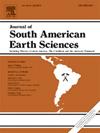Evaluation of the hydrogeological response to neotectonics of the Quequén Grande River Watershed using geoelectrical methods
IF 1.7
4区 地球科学
Q3 GEOSCIENCES, MULTIDISCIPLINARY
引用次数: 0
Abstract
The Quequén Grande River Watershed (Southeast of Buenos Aires Province, Argentina) is a strong asymmetrical watershed in the Pampean Plain. It is marked by the stream capture of the Quequén Grande River eastward. The topographic slopes and hydraulic gradients are typically low in this area, with streams and rivers primarily effluent along their courses. This behavior is attributable to the influence of the unconfined and shallow Pampean aquifer, which serves as the region's main source of water supply. In the southwestern limit of this drainage basin, several shallow lakes, disconnected from the surface drainage network and related to an old deflation/accumulation relief, occur over hillock formations. In this area, Paleozoic rocks crop out and constitute the hydrological basement of the aquifer. The bedrock architecture of this formation could explain the stream piracy of the Quequén Grande River eastward and the local geomorphology, where structural lineaments related to neotectonic movements have been reported. However, there is a lack of information related to the hydrological basement in depth, which is needed to understand the surface water dynamics of this drainage basin, linked to the topographic control of the landscape. To fill this gap, a geoelectric model of the hydrological basement is proposed from 37 Vertical Electrical Soundings and 6 Electric Resistivity Tomographies, aiming to contribute to understanding this portion of the Earth's crust. Geoelectrical surveys were performed over 3000 km2 of the southwestern limit of the Quequén Grande River Watershed. Results obtained and field observations suggest the deviation of the Quequén Grande River catchment eastward is caused by the hydrogeological basement structure in depth, in response to neotectonic movements inferred by structural lineaments.
利用地质电学方法评估水文地质对克尔昆格兰德河流域新构造的影响
克泉格兰德河流域(阿根廷布宜诺斯艾利斯省东南部)是潘潘平原上一个强烈的不对称流域。它的标志是克泉格兰德河向东的溪流汇入。该地区的地形坡度和水力坡度通常较低,溪流和河流主要沿河道流出。这种情况可归因于作为该地区主要水源的帕姆潘(Pampean)非承压浅含水层的影响。在该流域的西南部,有几个浅湖与地表排水网络断开,与古老的塌陷/堆积地貌有关,位于丘陵地貌之上。在这一地区,古生代岩石占据了主要位置,构成了含水层的水文基底。该地层的基岩结构可以解释奎因格兰德河向东的溪流盗采现象和当地的地貌,据报道,当地的构造线形与新构造运动有关。然而,目前还缺乏与水文基底深度相关的信息,而要了解这一流域的地表水动态,就需要了解与地形控制相关的信息。为了填补这一空白,根据 37 个垂直电测深和 6 个电阻率断层扫描,提出了一个水文基底的地质电学模型,旨在帮助人们了解地壳的这一部分。在克泉格兰德河流域西南部 3000 平方公里的范围内进行了地质电学勘测。获得的结果和实地观察表明,克泉格兰德河集水区向东的偏移是由水文地质基底结构在深处造成的,是对结构线状推断出的新构造运动的反应。
本文章由计算机程序翻译,如有差异,请以英文原文为准。
求助全文
约1分钟内获得全文
求助全文
来源期刊

Journal of South American Earth Sciences
地学-地球科学综合
CiteScore
3.70
自引率
22.20%
发文量
364
审稿时长
6-12 weeks
期刊介绍:
Papers must have a regional appeal and should present work of more than local significance. Research papers dealing with the regional geology of South American cratons and mobile belts, within the following research fields:
-Economic geology, metallogenesis and hydrocarbon genesis and reservoirs.
-Geophysics, geochemistry, volcanology, igneous and metamorphic petrology.
-Tectonics, neo- and seismotectonics and geodynamic modeling.
-Geomorphology, geological hazards, environmental geology, climate change in America and Antarctica, and soil research.
-Stratigraphy, sedimentology, structure and basin evolution.
-Paleontology, paleoecology, paleoclimatology and Quaternary geology.
New developments in already established regional projects and new initiatives dealing with the geology of the continent will be summarized and presented on a regular basis. Short notes, discussions, book reviews and conference and workshop reports will also be included when relevant.
 求助内容:
求助内容: 应助结果提醒方式:
应助结果提醒方式:


